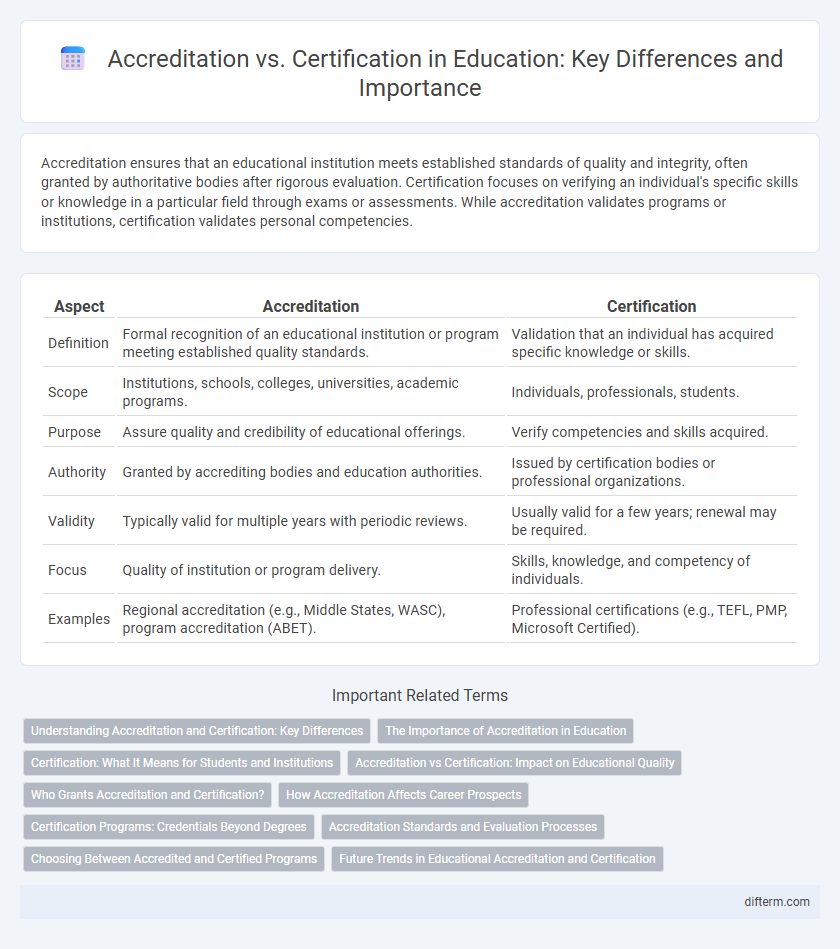Accreditation ensures that an educational institution meets established standards of quality and integrity, often granted by authoritative bodies after rigorous evaluation. Certification focuses on verifying an individual's specific skills or knowledge in a particular field through exams or assessments. While accreditation validates programs or institutions, certification validates personal competencies.
Table of Comparison
| Aspect | Accreditation | Certification |
|---|---|---|
| Definition | Formal recognition of an educational institution or program meeting established quality standards. | Validation that an individual has acquired specific knowledge or skills. |
| Scope | Institutions, schools, colleges, universities, academic programs. | Individuals, professionals, students. |
| Purpose | Assure quality and credibility of educational offerings. | Verify competencies and skills acquired. |
| Authority | Granted by accrediting bodies and education authorities. | Issued by certification bodies or professional organizations. |
| Validity | Typically valid for multiple years with periodic reviews. | Usually valid for a few years; renewal may be required. |
| Focus | Quality of institution or program delivery. | Skills, knowledge, and competency of individuals. |
| Examples | Regional accreditation (e.g., Middle States, WASC), program accreditation (ABET). | Professional certifications (e.g., TEFL, PMP, Microsoft Certified). |
Understanding Accreditation and Certification: Key Differences
Accreditation is a formal recognition granted to educational institutions or programs that meet established quality standards set by authorized agencies, ensuring institutional credibility and compliance. Certification, on the other hand, refers to the process through which individuals demonstrate specific skills or knowledge by passing exams or assessments, often provided by professional organizations. Understanding the distinction between accreditation and certification helps stakeholders evaluate educational quality at the institutional level versus individual competency in specific fields.
The Importance of Accreditation in Education
Accreditation ensures that educational institutions meet rigorous quality standards established by recognized accrediting bodies, promoting consistent academic excellence and institutional accountability. This process validates the credibility of programs, facilitating student eligibility for federal financial aid and transfer of credits across institutions. Unlike certification, which typically assesses individual competencies, accreditation evaluates the overall quality and effectiveness of an educational organization, enhancing student confidence and employer trust in the credentials earned.
Certification: What It Means for Students and Institutions
Certification validates specific skills and competencies acquired by students, providing assurances to employers and educational institutions about their qualifications. It serves as a tangible benchmark that can enhance student employability and institutional credibility in specialized fields. Unlike accreditation, which assesses entire programs or institutions, certification targets individual achievements and expertise.
Accreditation vs Certification: Impact on Educational Quality
Accreditation and certification both play critical roles in maintaining educational quality, but accreditation involves a comprehensive evaluation of an entire institution or program, ensuring adherence to established standards and continuous improvement. Certification typically focuses on verifying individual competencies or specific skills, providing targeted validation rather than assessing systemic quality. The impact of accreditation on educational quality is broader and more sustained, influencing institutional reputation, student outcomes, and eligibility for funding and licensure.
Who Grants Accreditation and Certification?
Accreditation is granted by recognized accrediting agencies or bodies that evaluate educational institutions and programs based on established quality standards. Certification, on the other hand, is awarded by professional organizations, industry groups, or government bodies to individuals who meet specific skill or knowledge criteria. These distinctions ensure that accreditation validates institutional quality while certification confirms personal competency in a particular field.
How Accreditation Affects Career Prospects
Accreditation ensures that educational institutions meet established quality standards, directly impacting graduates' credibility in the job market. Employers often prefer candidates from accredited programs, associating accreditation with rigorous training and validated skills. This preferential hiring enhances career prospects by providing graduates with recognized qualifications that align with industry expectations.
Certification Programs: Credentials Beyond Degrees
Certification programs offer specialized credentials that validate specific skills and competencies beyond traditional academic degrees, enhancing career prospects in fields like technology, healthcare, and education. These programs are often industry-recognized and tailored to meet evolving job market demands, providing practical, hands-on experience that complements formal education. Unlike accreditation, which assesses entire institutions or programs, certification focuses on individual qualifications, enabling professionals to demonstrate expertise and maintain competitive advantages.
Accreditation Standards and Evaluation Processes
Accreditation standards establish comprehensive criteria that educational institutions must meet to ensure quality, including curriculum relevance, faculty qualifications, and student outcomes. Evaluation processes in accreditation involve rigorous peer reviews, self-assessments, and site visits to verify compliance with these standards. Certification, by contrast, typically assesses individual competencies or specific programs rather than the overall institutional quality measured through accreditation.
Choosing Between Accredited and Certified Programs
Choosing between accredited and certified programs hinges on understanding accreditation's role in ensuring educational institutions meet rigorous standards set by recognized agencies, which directly impacts degree recognition and transferability. Certification, often granted to specific programs or courses, validates specialized skills and competencies but may lack broader institutional credibility. Prospective students should prioritize accredited programs when seeking comprehensive academic legitimacy and opt for certification when targeting targeted professional qualifications or skill enhancement.
Future Trends in Educational Accreditation and Certification
Emerging trends in educational accreditation emphasize adaptive frameworks that integrate real-time data analytics and continuous improvement models, enhancing institutional accountability and learner outcomes. Certification processes are increasingly shifting toward micro-credentials and digital badges, reflecting skills mastery and lifelong learning in rapidly evolving job markets. The convergence of AI-driven assessments with blockchain technology promises secure, transparent validation of both accreditation and certification achievements.
accreditation vs certification Infographic

 difterm.com
difterm.com